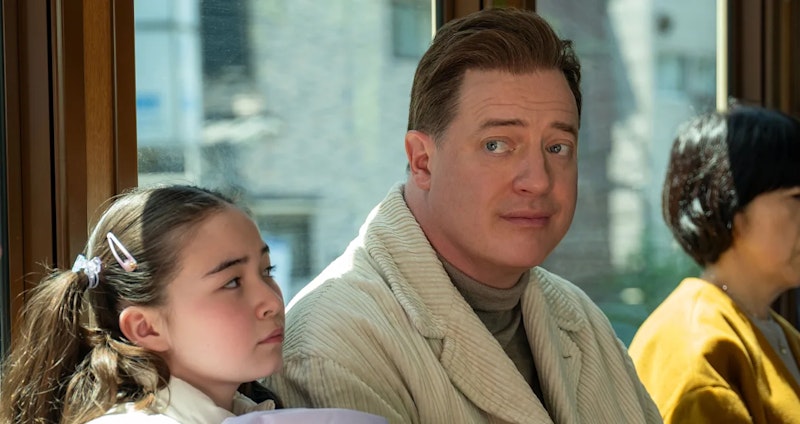It’s not a backhanded compliment to say that Rental Family is a film that would’ve been a blockbuster three decades ago. The generation that fell in love with Forrest Gump’s reimagining of history and accepted the ignorant (if well-intentioned) cultural curiosity of Mrs. Doubtfire and American Beauty would’ve fallen for Hikari’s impressive cinematic debut, which unabashedly has its heart on its sleeve. Rental Family isn’t out of touch, because its insights on the transactional nature of affection within the gig economy are on point. However, it’s also a film that’s asked its audience to accept a slightly more convenient, poetic, and ultimately hopeful version of reality than contemporary cinema has been interested in.
Although Rental Family is an original story from Hikari and her co-writer Stephen Blahut, it's inspired by a real practice in Japan that began in the 1990s. Clients would hire professional actors to stand-in for family members, friends, co-workers, or other intimate relations for a variety of professional and personal events. The presence of a father might allow a single mother to get her child into a better secondary school, and an appearance by a fake husband might allow a lesbian bride to hide her real lover from her parents. These services are likely a lot less idiosyncratic and whimsical than they’re portrayed in Rental Family, but it’s not fabricated for the sake of making generalizations about Japanese culture. In fact, the prominence of these companies suggest that Japanese society hasn’t found an appropriate way to deal with mental health conversations, and that its citizens find it much easier to tell comforting lies.
Rental Family is most likely to evoke comparisons to less progressive films because its protagonist is a white man, but this isn’t an instance like in Lost in Translation where a cynical American is left to enjoy the exotic pleasures of Tokyo. Brendan Fraser’s Phillip Vandarploeug is no white savior, and has lived long enough in Japan that he’s no longer an outsider. Phillip has faced the same dodgy career prospects that many middle-aged actors experience, and he’s not expected to have a big break anytime soon. However, Phillip’s longevity within Japanese commercials and soap operas has given him enough cultural awareness that he’s selected by the Rental Family agency owner Shinji (Takehiro Hira) to put his skills to use.
Fraser’s an actor whose off-screen personal life has become so inextricable from his film roles that it's challenging to not view any of his upcoming projects as slightly metatextual. Although Fraser graduated from the same class of School Ties alum that included Matt Damon, Ben Affleck, Chris O’Donnell, and Cole Hauser, he navigated towards soapy (Still Breathing), family vehicles (George of the Jungle), high-concept rom-coms (Blast from the Past), and unexpected blockbusters (The Mummy). Fraser became a punching bag in more ways than one; not only did he deteriorate his body in an era where stunt safety wasn’t a priority, but he received scathing, personal attacks for his selection of roles. Although Fraser was discounted as a lost cause by the time that Inkheart flopped, he’d already been blackballed from the industry after being allegedly assaulted by Golden Globes President Phil Berk.
As a result of the unspoken undercurrent of sadness and self-defeat within Fraser’s performance, Rental Family is more justified in its reaches to be disarmingly funny or straight-faced in its truthfulness. Fraser’s allowed to be a big-hearted goofball without being performative; this isn’t a film that would’ve worked with a snappy comedian like Ben Stiller in the role, but it would also be inappropriate for a more traditional leading man like Bradley Cooper. Phillip doesn’t have to provide exposition about his past to indicate that he’s regretful of the way his marriage turned out, because a white actor doesn’t live in Tokyo if he had a welcoming home back in America. Phillip’s failures as an ex-husband, failed father, and unsuccessful actor are a result of his lack of self-confidence, and not any selfish or aggressive tendencies.
Rental Family is an impressive cinematic debut for Hikari, who’d previously shown her merits with several standout episodes of Shogun and Beef. While television credits are often a good prep for feature-length work, the episodic medium doesn’t require significant tonal fluctuations. Rental Family could be mistaken as a sitcom in its first hour, particularly after Phillip is nearly fired after getting cold feet before a few major client meetings. The suspense regarding how the story will resolve is begun after Phillip’s confidence is raised; he’s become so good at his job that he’s forced to question the ethics of being able to appear and then disappear from the lives of strangers.
Even if Rental Family can’t offer any resolutions to a practice that’s ongoing, it’s able to examine a multitude of scenarios in which it would be beneficial, as well as incidents that only exacerbated existing issues. One of the stronger subplots is centered on Phillip’s interactions with the aging actor Kikuo Hasegawa (Akira Emoto), whose only desire is to feel like he’s remembered, and not simply waiting for death’s call. Otherwise, a storyline centered on Phillip’s co-worker Aiko (Mari Yamamoto) is underdeveloped because of its banal commentary on infidelity and marital fissures. In a film that had otherwise managed to be judgment-free, this section is unreasonably slanted to favor one party in a manner that’s manipulative.
Rental Family could be classified as a tearjerker, but its most powerful moments aren’t unearned; it’s bold that Hikari was able to provide emotional catharsis without reliance on any shocking last-minute plot twists. In a fall dominated by heavy films, it’s rare to find a drama aimed at adults that isn’t weighed down by its self-imposed meaning. A cozy movie with a nice message used to be a cliche, but in the window of Rental Family’s release, it’s an anomaly.

